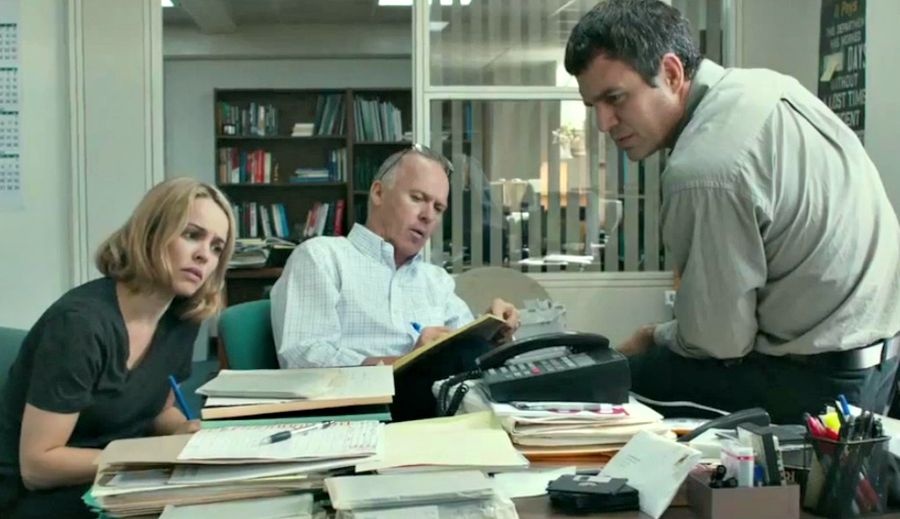"Spotlight:" the Story behind the Story of Boston's Catholic Church Sex Scandal
By John Horn and Elizabeth
When the Boston Globe reported in 2002 on sex abuse lawsuits that were pending against five local priests, it wasn't the first time the Catholic Church had come under such charges. But the coverage gathered steam and eventually became a national, then international, story. Victims from around the world came forward with cases that sometimes reached back decades. They revealed not only the extent of abuse, but also the institutionalized efforts to sweep charges under the rug. In Boston, each of the five charged priests were given prison sentences. Meanwhile, the Boston Globe reporters won the 2003 Pulitzer Prize for Public Service for their coverage. Now their story is being told. "Spotlight," written by Tom McCarthy and Josh Singer, explores what it was like for the Globe's journalists to conduct one of the last great investigative reports before the age of Internet journalism. Writer Josh Singer met with The Frame's John Horn to talk about the movie and the light it sheds on the state of journalism. INTERVIEW HIGHLIGHTS The hook for us was this story about this Jewish editor, who had never lived in Boston Ė Marty Baron. On his first day he reads a story about this priest, John Geoghan, and this lawyer, Mitch Garabedian, whoís representing a number of victims who Geoghan molested. Garabedianís saying, Cardinal [Bernard Francis] Law ought to know about this. And Cardinal Lawís saying, I didnít know about this. And Marty Baron on his first day is saying, Why arenít we going after documents that are under seal, and why arenít we suing for those? Moreover, why donít we put long form investigative journalists onto this story? Going after the church was unheard of. Going after the church in Boston ó and I donít mean this lightly ó is a little like going after the mob. This is not something that is done. Whatís not widely known is that it wasnít just the church. It was a lot of people looking the other way. And to me, what makes this a universal story is this theme of deference. Why do we look the other way? And you see this not only with the Catholic Church scandal, but you see it with Penn State, with the BBC and Jimmy Savile, you see it with Bill Cosby. You probably had to spend a fair amount of time talking to the reporters. Movies tend to get newsrooms so wrong. So in talking to the reporters, what were the cliches that were very important to them that the film avoided? This all started in L.A. Mike Rezendes happened to be in L.A. Heís one of the Boston Globe reporters. Yes, heís played by Mark Ruffalo. Mike was in L.A. Five days in a row I took him out to lunch, and Iíd get him talking. I assembled like a 60-page document ó those were my notes from him talking and those were sort of the basics for us. And then we started going up to Boston, [director] Tom [McCarthy] and I. Tom was very interested in the research. Originally, I was supposed to write the script. It became apparent pretty quickly that this would be better if we did [the research] together. What was so exciting for me was that Tom from the very beginning really wanted to get it right. Verisimilitude was his watchword. I was ready to start outlining after like 2-3 trips to Boston. But Tom was like, No, letís keep going. So you became an investigative reporter in your own way. One thing thatís interesting is the reporters didnít tell us everything. Now, Iím very close with ó I think ó all of them, and theyíre all such heroes. But they were a little cagey about details. So we had to push to get those details from other folks. We uncovered a couple of things that we didnít hear from the reporters. We had to go out and talk to the lawyers and really get an idea of it. Whatís fascinating again is it reinforced this notion that nobodyís guilty and nobodyís innocent. Thereís a lawyer in the [movie] trailer who comes off as a bad guy. Heís not a bad guy ó he was trying to do the right thing too. And itís literally about trying to get his side of the story. Everyoneís a little gray. This movie also has a lot to say about the state of journalism. There was a shot of the Boston Globe from the outside of the building, and thereís a billboard for America Online. Itís the advent of computer-assisted reporting. This is a story that was reported when you had to go through phonebooks, make your own spreadsheets. It was pre-Internet reporting. This was one of the last great investigations done that way. The last 10-to-15 years have not been kind to traditional media. What I would love to do is create a conversation and a drive to tell people, Buy your local paper! Buy the L.A. Times! You want those reporters on the ground, doing that investigation. Local news is so important. And thatís something I think people donít appreciate: people think of the clergy sex abuse scandal as an international story. Sure, but at the heart of it, the very first story was a local investigation. These were local journalists in Boston. Just like Watergate ó they were metro reporters looking into a break-in, and it turned into a national story. Thatís how we get these bigger stories.
|
.
Any original material on these pages is copyright © BishopAccountability.org 2004. Reproduce freely with attribution.
